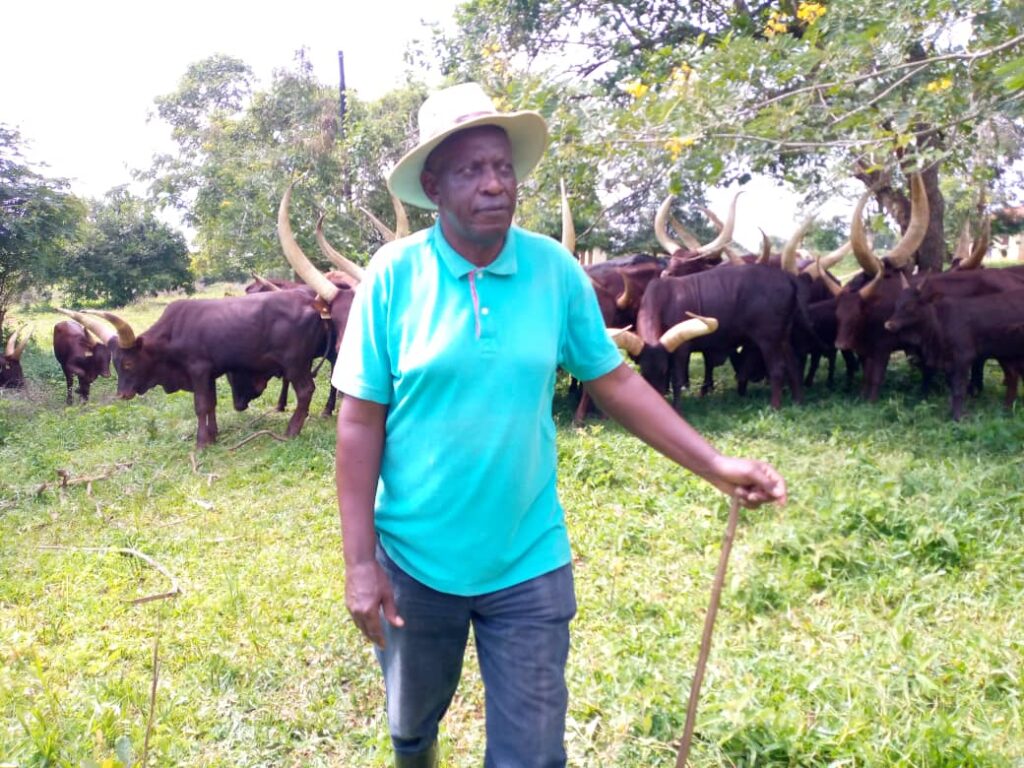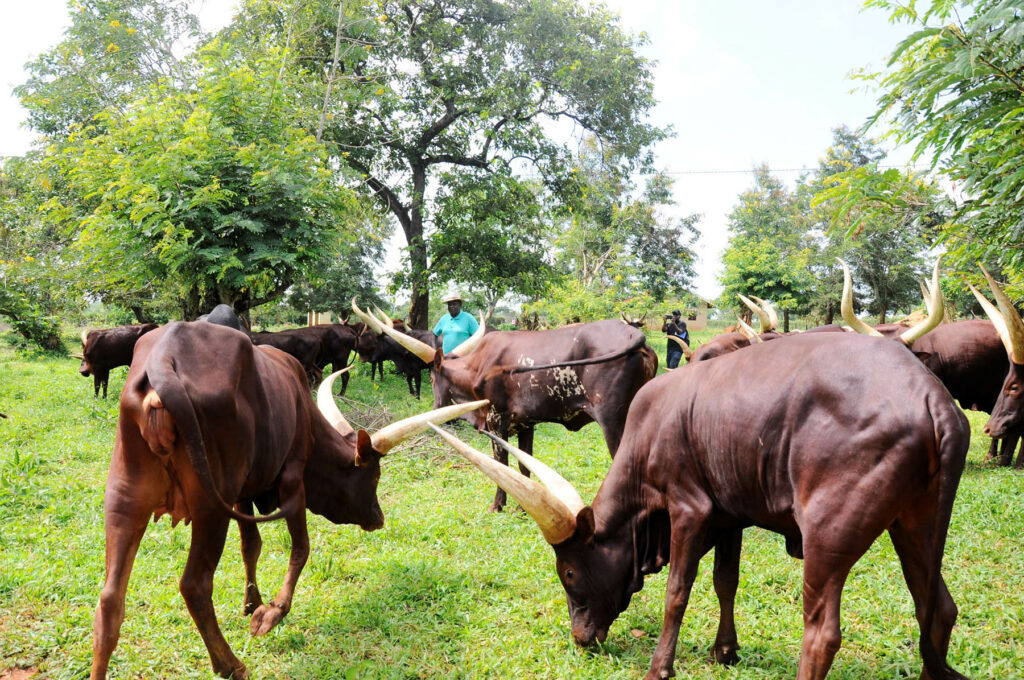By Umar Nsubuga

Dr David Kamukama speaks about his cows with a passion akin to that of a typical cattle keeper, but he took it a notch higher by embracing modern practices. He applies modern ranching techniques, improved nutrition regime of cattle and has commercial breeds.
Kamukama is a household name in Nabiswera sub-county and Namansa business centre, not for any other reason but cattle ranching.
The name Kamukama rings a bell to almost every cattle farmer in Nakasongola district.
The local residents refer to him fondly as Omusajja ow’ente, and its Butiti ranch.
Kamukama believes agri-business is the way to go. “This is the best way one can create wealth, employment, social impact and societal transformation,” he says.
Genesis
He started as a private vet surgeon in 1988. “I started small as a young person, and with my colleagues, we formed a company called Intervet Services, a consulting firm, as a vehicle that delivered many successful agri-projects in eastern Africa (Ethiopia, Kenya, Uganda and Tanzania), ” he explains.
In 2004, he ventured into ranching in Nakasongola, which he explains, he chose because the area is located in the cattle corridor and land was affordable. Today he has 5,000 acres
“I bought enough land using my savings from work outside the country and started with 500 cows. Of these, my father had given me some and I had imported 10 good breeds.
“I gradually stocked the animals and developed the ranch,” he says.
Over 18 years, Kamukama says he has been stocking, breeding, and multiplying beef animals.
Donald Musiime, the chief executive officer and his son, says currently, the structure of the herd is that they are grouped according to their breeds.
Since this is a breeding and multiplication ranch, Musiime says their focus is on beef production.
“The milk we get from some of the animals is for domestic consumption, because we have over 100 workers here,” Musiime explains.
Fighting the drought
Nakasongola is one of the districts in the cattle corridor that often experiences prolonged dry spells annually.
One of the biggest challenges he is facing, Kamukama says, is the change in seasons, and Nakasongola is a semi-arid area. He adds that the area becomes very dry and during that season, the livestock gets emaciated owing to a lack of pasture.
“As a result, I decided to go into animal feed production and fattening. We are now completing a feedlot infrastructure, and the bulls will be selected after weaning from mothers, and be subjected to 3-4 months supplementary feeding and fattening before they are sold. We weigh them every week and when they attain the slaughter weight, which is about 450-500 kg, they are sold,” he explains.
When the animals are ready, they are sold through auction to the highest bidder.
“In the long term, however, we plan to have our own slaughter and processing facility, through which we will be able to sell our own brand on local and international markets”
Daniel Bugaba, another of Kamukama’s sons and the marketing manager, and says they plan to have well-established pastures to sustain the aggressive fattening strategy. In addition, they also have an improved nutrition regime and animal management system that includes the making of silage and hay. He adds they have since planted the Napier and Chloris Gayana gardens.
Regarding the farm’s management, Kamukama says it a family project, where he is the chairman, and his son Musiime (IT Expert) is the CEO. The other son, Bugaba (financial analyst & marketeer) is the marketing manager, and wife Ruth Kamukama is the chief finance officer.
Other staff members, Kamukama says, include a ranch manager, a veterinary officer, more than 40 herdsmen and 100 other workers.
Physical and bio security
The main entrance is manned by a 24/7 security guard, plus a night patrol of private security guards. The cattle and goats are regularly vaccinated against epidemic diseases, rampant in the area and the country at large, like Foot and mouth disease, among others.
Marketing
Every year, Kamukama says, there are two auctions per year and at each time, 300-400 cattle are sold. He adds that the cattle fetch low prices because they work with middlemen. To mitigate this, he explains that the plan is to create their own market-structured system.
On average, a kilo of live beef is about sh6,000, and animals are sold at the age of 15 months.

Community impact
In terms of impact, Bugaba says the ranch employs many youths. “We have 45 permanent staff, and 100 casual laborers, especially during the dry season when we are doing bush clearing,” Bugaba says.
“I link up with community farmers such as Nabiswera Beef Farmers Association, where I am a member.”
According to Kamukama, the idea is to bring farmers for training, so that they get the skills and knowledge we have imparted here and replicate on their own farms.
The link with the community is related to the project work he did in Ethiopia for four years. “The project I led was called Food Security and Rural Entrepreneurship’ funded by RNE, Netherlands.
Remember, the principle saying under value chain development, “the point of intervention does not necessarily have to be the point of targeted impact”.
“Your targeted point of impact needs to be at the society level, but you can intervene at a nucleus farm level like this and have maximum impact at the community. By having interventions on this farm, we can create a bigger impact at a community level”, Kamukama narrates.
Achievements
His greatest achievement, Kamukama says, is having community members emulating his enterprises. He says so far seven farmers in the community have improved beef cattle breeds and 25 others have up taken fattening of cattle during dry season, and established napier grass gardens, whose seed were obtained from Butiti ranch.
In addition, community members have improved their breeds using over 250 bulls, specifically of the boran breed, purchased from the ranch.
Kamukama says he created employment opportunities for over 100 youths employed on the ranch.
“Having reliable permanent workers is an achievement because sole sourcing around the communities; subject them to rigorous training, and pay good wages and salaries, brings development.”
Challenges
Their biggest challenge, Kamukama says, is on disease control.
“We try as a ranch to have a robust disease control and preventive mechanism. Nevertheless, we still have challenges with diseases associated with ticks.” He attributes the challenge to ticks becoming resistant to acaricides owing to misuse and some being fake.
“Our biggest expense now goes towards the treatment of tick-borne diseases, which take up to 75% of our drugs bill every month.”
The second challenge is drought associated problems like water shortage and lack of pastures. “We have tried to invest heavily in this field, excavated valley dams and have planted pastures for harvesting, to mitigate against pasture shortage during the dry seasons.”
To mitigate this, he says, they plan to grow drought-resistant pastures like lab lab.
“We are also challenged by cattle theft, although we work closely with the local government to ensure that we implement measures to stop it.”
Other exploits
While in the field, he says, he observed there was a gap in agricultural development in Uganda. During his studies, he had travelled to Europe where he says, he was impressed by their advanced farms and he drew the conclusion that was one of the reasons the countries were very developed.
“In Europe (Poland), I lived on a farm for six months doing my practicals, and got skills and knowledge, that was 1987”, he said.
In Uganda, Kamukama has served on several agri-related boards, including Private Sector Foundation Uganda (PSFU), National Agricultural Advisory Services (NAADS) programme in 2001 – 2009.
In 1998, Kamukama and his colleagues mobilised progressive beef farmers countrywide and formed the Uganda Beef Producers’ Association to work as team.
In 2003, Kamukama was elected by the entire veterinary members as their leader in Uganda, to be the Vice President of the Uganda Veterinary Association.
For the last 30 years, he has been doing consultancy work at an international level, with support from both local and multinational funders in those respective countries.
Kamukama is currently an International Agribusiness Consultant, and he has undertaken projects in Ethiopia, Kenya, Malawi, Tanzania, Burundi and Uganda. He is the Chairman and Director at Ugagri, a consulting and farming group.
Message to the youths
His key advice to youths is they must have passion in whatever they do, especially agriculture. “One of my passions is to engage in it is because I studied it and now, I use it to make humanity better, by bringing about change in the society. Also, you must work towards saving however little money but target to build – up enough capital, regardless of how much it is”, he advises.
Background
Kamukama says his parents and grandparents were cattle keepers. “My grandparents migrated from Mpororo (the current Ntungamo district), and I was born in the present-day Sheema district. Later, my parents moved to Kashongi in the current Kiruhura district in 1974, and that is where my siblings and I grew up,” he says.
Kamukama went to Ntare school for his secondary education, and later continued to university, at Kishinev State University in Moldova, where he graduated with bachelor’s and master’s degrees in veterinary medicine.
What others say
Rashid Mukasa, a contractor for feedlots
Dr Kamukama is an inspiration to many of us in this area. His gradual development into a commercial farmer has made many of us follow him up. I am currently turning my land into a commercial farm, thanks to his model.
Charles Baguma, a commercial farmer
Dr Kamukama is a self-driven man; I have dealt with him with farming ventures and he is a result orientated honest man. He is a great friend as well with a big heart.
Harriet Agaba, a resident
Following Dr Kamukama’s advice, I decided to take cows as a big business, and I take mine as gold, in terms of feeding and treating.





